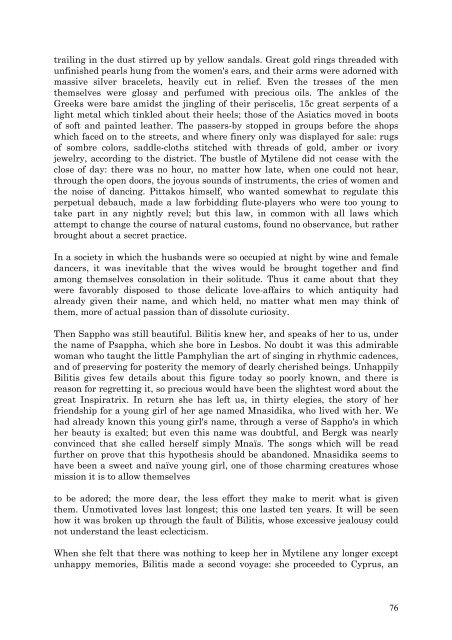Create successful ePaper yourself
Turn your PDF publications into a flip-book with our unique Google optimized e-Paper software.
trailing in the dust stirred up by yellow sandals. Great gold rings threaded with<br />
unfinished pearls hung from the women's ears, and their arms were adorned with<br />
massive silver bracelets, heavily cut in relief. Even the tresses <strong>of</strong> the men<br />
themselves were glossy and perfumed with precious oils. The ankles <strong>of</strong> the<br />
Greeks were bare amidst the jingling <strong>of</strong> their periscelis, 15c great serpents <strong>of</strong> a<br />
light metal which tinkled about their heels; those <strong>of</strong> the Asiatics moved in boots<br />
<strong>of</strong> s<strong>of</strong>t and painted leather. The passers-by stopped in groups before the shops<br />
which faced on to the streets, and where finery only was displayed for sale: rugs<br />
<strong>of</strong> sombre colors, saddle-cloths stitched with threads <strong>of</strong> gold, amber or ivory<br />
jewelry, according to the district. The bustle <strong>of</strong> Mytilene did not cease with the<br />
close <strong>of</strong> day: there was no hour, no matter how late, when one could not hear,<br />
through the open doors, the joyous sounds <strong>of</strong> instruments, the cries <strong>of</strong> women and<br />
the noise <strong>of</strong> dancing. Pittakos himself, who wanted somewhat to regulate this<br />
perpetual debauch, made a law forbidding flute-players who were too young to<br />
take part in any nightly revel; but this law, in common with all laws which<br />
attempt to change the course <strong>of</strong> natural customs, found no observance, but rather<br />
brought about a secret practice.<br />
In a society in which the husbands were so occupied at night by wine and female<br />
dancers, it was inevitable that the wives would be brought together and find<br />
among themselves consolation in their solitude. Thus it came about that they<br />
were favorably disposed to those delicate love-affairs to which antiquity had<br />
already given their name, and which held, no matter what men may think <strong>of</strong><br />
them, more <strong>of</strong> actual passion than <strong>of</strong> dissolute curiosity.<br />
Then Sappho was still beautiful. <strong>Bilitis</strong> knew her, and speaks <strong>of</strong> her to us, under<br />
the name <strong>of</strong> Psappha, which she bore in Lesbos. No doubt it was this admirable<br />
woman who taught the little Pamphylian the art <strong>of</strong> singing in rhythmic cadences,<br />
and <strong>of</strong> preserving for posterity the memory <strong>of</strong> dearly cherished beings. Unhappily<br />
<strong>Bilitis</strong> gives few details about this figure today so poorly known, and there is<br />
reason for regretting it, so precious would have been the slightest word about the<br />
great Inspiratrix. In return she has left us, in thirty elegies, the story <strong>of</strong> her<br />
friendship for a young girl <strong>of</strong> her age named Mnasidika, who lived with her. We<br />
had already known this young girl's name, through a verse <strong>of</strong> Sappho's in which<br />
her beauty is exalted; but even this name was doubtful, and Bergk was nearly<br />
convinced that she called herself simply Mnaïs. The songs which will be read<br />
further on prove that this hypothesis should be abandoned. Mnasidika seems to<br />
have been a sweet and naïve young girl, one <strong>of</strong> those charming creatures whose<br />
mission it is to allow themselves<br />
to be adored; the more dear, the less effort they make to merit what is given<br />
them. Unmotivated loves last longest; this one lasted ten years. It will be seen<br />
how it was broken up through the fault <strong>of</strong> <strong>Bilitis</strong>, whose excessive jealousy could<br />
not understand the least eclecticism.<br />
When she felt that there was nothing to keep her in Mytilene any longer except<br />
unhappy memories, <strong>Bilitis</strong> made a second voyage: she proceeded to Cyprus, an<br />
76








